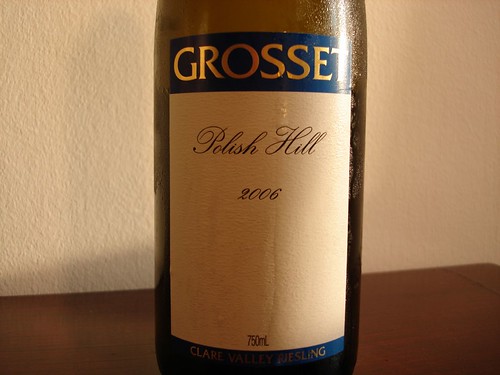It is Saturday night and we are planning on eating Sauerkraut. What Riesling should I chose? One with some sweetness, like a German Spätlese or a dry limey expression from Australia? I got three bottles out, a German Spätlese 2001 from Friedrich-Wilhelm-Gymnasium, Grosset's Polish Hill 2006 from the Clare Valley and a 1998 Smaragd Riesling from the Wachau, en Autriche .
 Better start with the older vintage first. The cork was weird, part of it was missing, as if someone took a knife and chopped the left bottom part of it off. When I poured it, I knew something was wrong. The wine was almost as keep as a 50 year old Chenin from the Loire, and immediately, I knew it was going to be oxydised. I was right. The wine was oxydised and totally out of condition. Daniel, when asked, chose to keep on going with a dry Riesling, so I twisted the Stelvin off of the Polish Hill 2006, a wine, winemaker and winery I have come to respect and like very much.
Better start with the older vintage first. The cork was weird, part of it was missing, as if someone took a knife and chopped the left bottom part of it off. When I poured it, I knew something was wrong. The wine was almost as keep as a 50 year old Chenin from the Loire, and immediately, I knew it was going to be oxydised. I was right. The wine was oxydised and totally out of condition. Daniel, when asked, chose to keep on going with a dry Riesling, so I twisted the Stelvin off of the Polish Hill 2006, a wine, winemaker and winery I have come to respect and like very much.
 The wine is every bit as I remembered it to be, gently imposing itself if you give it a chance. Very flinty and mineral with mostly citrus fruits, it is tight and pure, concentrated, yet delicate. Happy to have bought it, happy to drink it. Will it be the best choice with the sauerkraut, I do not know, it is very acidic and the cabbage will also be.
The wine is every bit as I remembered it to be, gently imposing itself if you give it a chance. Very flinty and mineral with mostly citrus fruits, it is tight and pure, concentrated, yet delicate. Happy to have bought it, happy to drink it. Will it be the best choice with the sauerkraut, I do not know, it is very acidic and the cabbage will also be.
Surprise! Surprise! The Polish Hill was much better with food than I expected. If there was one element standing out from this dish it was saltiness. The speck and all the sausages, including the very fresh and delicious Weisswurst, were rather very salty. The wine showed a different side with every bite. It was at its most mineral with the acidic sauerkraut, and perhaps at its best too. Just proves to show that it is only by trying that you will know.

Aucun commentaire:
Publier un commentaire